
City’s History in Brief in Lagos, Lagos, Nigeria
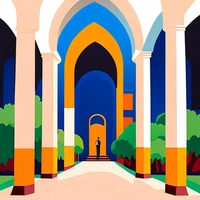
1. National Museum Lagos
The National Museum is a treasure trove of Nigerian history, with artifacts that date back centuries, including terracotta and bronze figures. It provides insight into the artistic heritage of Nigeria's different cultures. The museum's collection helps travelers understand the diverse historical influences of Lagos.
- Location: Situated in Onikan, a central part of Lagos Island.
- Historical Significance: Houses the famous Festac '77 drum and Nok Terracotta sculptures.
- Guide Availability: Offers guided tours to enhance understanding of exhibits.

2. Freedom Park
Originally a colonial-era prison, Freedom Park has been transformed into a cultural hub. It offers travelers a unique experience that blends history and leisure, illustrating Lagos' evolution from colonialism to freedom. The park celebrates the rich culture of Lagos with regular performances and events.
- Accessibility: Open to the public year-round.
- Events: Hosts regular cultural and music events.
- Historical Significance: The park’s structures, like the old prison wall, are preserved.
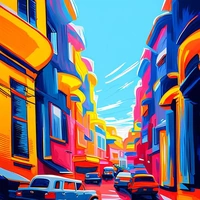
3. Lagos Island
This area is the heart of the city's history, featuring a blend of colonial architecture and modern influences. Lagos Island was a focal point during the colonial era and remains an economic and cultural hub. It provides travelers with a glimpse into the city's complex past and vibrant present.
- Landmarks: Home to places like Tinubu Square and Tafawa Balewa Square.
- Architecture: Features colonial-era buildings.
- Vibe: Bustling and commercially active, reflecting the energy of Lagos.
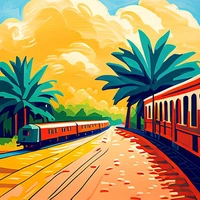
4. Nigerian Railway Corporation Museum
Showcasing the development of rail transport, this museum is ideal for understanding the role of railroads in Lagos' growth. It houses vintage locomotives and unique railway memorabilia. The museum depicts how rail connectivity contributed to Lagos' socioeconomic development.
- Exhibits: Includes historical trains and rail equipment.
- Operating Hours: Typically open weekdays.
- Education: Offers insights and information plaques on railway history.
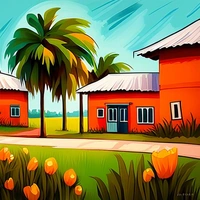
5. Badagry Heritage Museum
Located in Badagry town, this museum provides a poignant look at the Transatlantic Slave Trade. With artifacts and exhibits on display, it chronicles the harrowing history and resilience of those who went through Badagry. This museum is essential for travelers wishing to understand this darker chapter of history.
- Location: In the historic town of Badagry, some distance from central Lagos.
- Emotional Impact: Exhibits are poignant and evocative.
- Cultural Sensitivity: Encourages respectful engagement with the past.
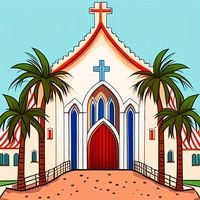
6. Cathedral Church of Christ Lagos
Known for its impressive Gothic architecture, this is the first Anglican cathedral in Nigeria. Established during colonial times, the church is a symbol of historical religious influences in Lagos. Visitors can enjoy its beautiful stained glass windows and serene environment.
- Architecture: Features Gothic-style design.
- Services: Visitors can attend services or explore during non-worship times.
- Iconic: A prominent symbol of Christianity in Nigeria.
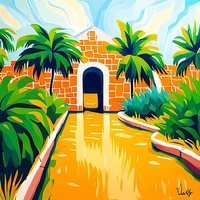
7. Lekki Conservation Centre
While primarily a nature reserve, the center offers insights into the preservation history and ecological conservation efforts in Lagos. The canopy walk is a draw, but its role in conserving the city’s green lungs is its historical highlight. The center underscores the balance between urban development and nature.
- Eco-focus: Emphasizes environmental education.
- Walking Trails: Offers easy-to-navigate boardwalks.
- Wildlife: Home to monkeys and other native species.

8. Iga Idunganran
This is the traditional palace of the Oba (king) of Lagos and a site that tells the story of Lagos' pre-colonial and colonial past. As the Oba's residence since the 1600s, it provides insights into the traditions and governance of Lagos. The palace reflects the continuity of historical and cultural leadership.
- Tradition: Highlights Yoruba traditions and monarchy.
- Accessibility: Visits are often by appointment or during special events.
- Architecture: A mix of traditional and colonial influences.
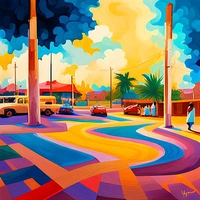
9. Tinubu Square
This historical square is named after Madam Efunroye Tinubu, a formidable businesswoman and political influence in Lagos. It serves as a memorial to her contributions and offers a glimpse into the role of prominent women in Lagos' history. The square is a vibrant part of the city's commercial district.
- Location: Central to Lagos' business area.
- Monuments: Features statues and plaques.
- Heritage Value: Celebrates a key female historical figure in Nigeria.
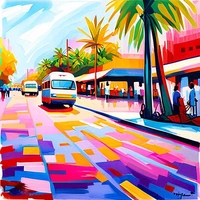
10. Tafawa Balewa Square
Built in memory of Nigeria’s independence, this square is a key historical and social gathering point. Its location has been central to significant national events, including independence celebrations. The square commemorates Nigeria's journey from colonial rule to an independent nation.
- Historical Significance: Site of Nigeria's independence celebrations.
- Monuments: Includes iconic Independence House.
- Social Hub: Hosts public events and gatherings.
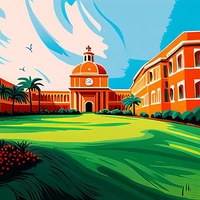
11. King’s College Lagos
As one of the oldest secondary schools in Nigeria, King’s College represents the history of education in Lagos. The school was instrumental in educating significant figures in Nigeria's colonial and post-colonial administrations. The college showcases academic traditions and achievements.
- Historical Background: Established during colonial era.
- Alumni Influence: Produced many key Nigerian leaders.
- Architectural Heritage: Features colonial-style buildings.
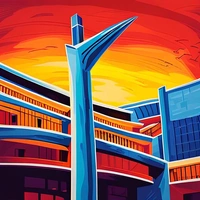
12. National Theatre
A large cultural and architectural landmark, the National Theatre symbolizes Nigeria's post-independence artistic aspirations. It was constructed for the Festival of Arts and Culture in 1977, showcasing Nigeria’s artistic history. Travelers can enjoy performances or simply admire the striking structure.
- Cultural Venue: Hosts arts, music, and film events.
- Design: Known for its distinctive architectural style.
- Accessibility: Located in central Lagos, accessible by various transport.
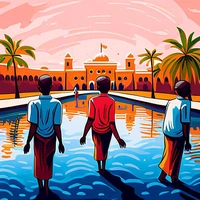
13. Kalakuta Republic Museum
Formerly the residence of the famous musician Fela Kuti, this museum provides a look at Lagos' vibrant music and political history. The building captures the spirit of Fela's activism and music, reflecting Nigeria's Afrobeat legacy. It's a must-visit for fans of music and modern African history.
- Musical Legacy: Celebrates Fela Kuti’s impact.
- Guided Tours: Available to provide historical context.
- Cultural Icon: Illustrates the fusion of music and political movement.
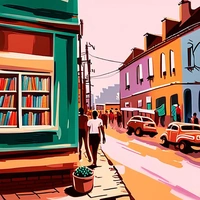
14. CSS Bookshops
One of the oldest bookshops in Lagos, signifying the history of literature and publishing in the city. Established in the 1800s, it has served as a key intellectual hub for generations. The bookshop enables travelers to explore Nigerian literature and thought.
- Book Selection: Features a wide range of texts, particularly Nigerian authors.
- Heritage Value: Longstanding presence in the literary scene.
- Accessibility: Located centrally, ideal for visitors exploring Lagos Island.
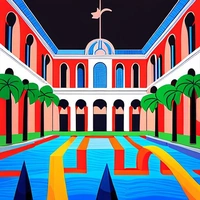
15. Lagos City Hall
This historic building is where many of the city’s administrative decisions were made during the colonial period. It has hosted significant political events and decisions shaping Lagos' development. The architecture offers a window into the city’s governance past.
- Architectural Significance: Known for colonial architectural style.
- Event Hosting: Available for public tours during certain city events.
- Governance Heritage: Reflects colonial and post-colonial administrative history.
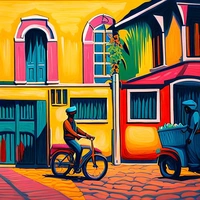
16. Hausas Quarters
Known for its traditional Hausa culture, this area provides insights into the Hausa people's influence in Lagos. The quarters highlight the city's ethnic diversity and historical migration patterns. Travelers can experience the blend of cultures through local cuisine and architecture.
- Cultural Diversity: Offers a mix of Hausa customs within Lagos.
- Market Area: Known for rich local markets.
- Historical Influence: Reflects migration and economic exchange.
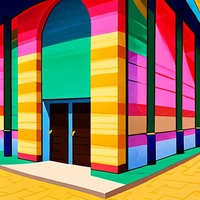
17. New Afrika Shrine
A successor to Fela Kuti’s original Shrine, this venue is a focal point of the city’s musical history. It hosts performances by his son Femi Kuti and celebrates the Afrobeat genre that resonated globally. The shrine offers an authentic experience of Lagos' dynamic musical culture.
- Performance Venue: Regular live music shows.
- Musical Heritage: Supports and celebrates Afrobeat music.
- Social Atmosphere: Known for lively and energetic gatherings.
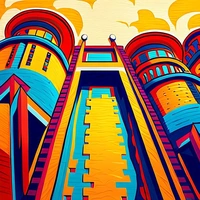
18. University of Lagos
Established in 1962, Unilag has played a vital role in shaping the education landscape of Lagos. The university's history and contributions offer insights into post-colonial educational advancements in Nigeria. It serves as a testament to Nigeria’s commitment to higher education.
- Academic Legacy: Considered a leading institution in Africa.
- Undergraduate and Graduate Programs: Offers wide-ranging courses.
- Research Focus: A hub for innovation and academic studies.
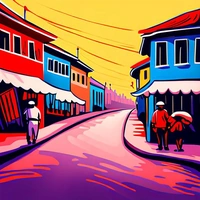
19. Brazilian Quarter
The area showcases the impact of Afro-Brazilian ex-slaves who returned to Lagos after the abolition of slavery. Influences of Brazilian architecture and culture are evident, providing a unique blend of African and South American heritage. It offers an interesting narrative of cross-continental connections.
- Architectural Style: Features Brazilian-influenced buildings.
- Cultural Integration: Blend of Brazilian and Nigerian customs.
- Historical Significance: Represents migratory and cultural exchange.
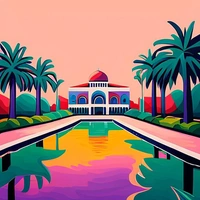
20. J.K. Randle Centre
This cultural hub, named after Dr. J.K. Randle, plays a key role in preserving the cultural history of Lagos. It facilitates dialogues through exhibitions, art, and music, contributing to the city's rich cultural tapestry. A visit here enriches one's understanding of Lagos' historical narrative through cultural expression.
- Heritage Promotion: Engages with cultural arts and history.
- Community Focus: Hosts interactive and educational events.
- Cultural Landmark: Located in the heart of Lagos, drawing diverse audiences.
